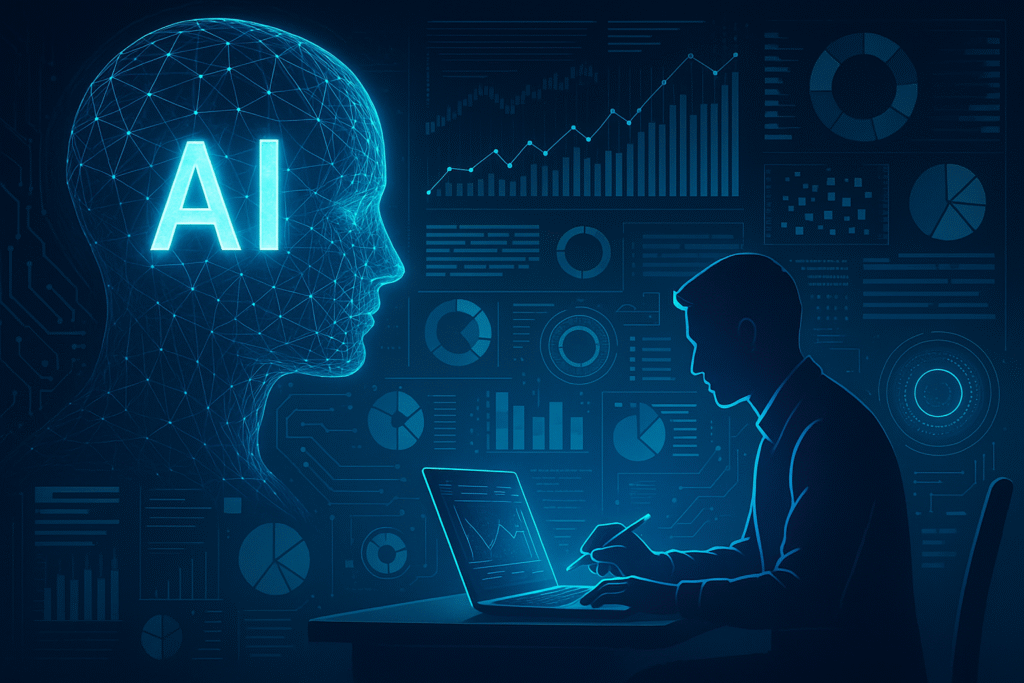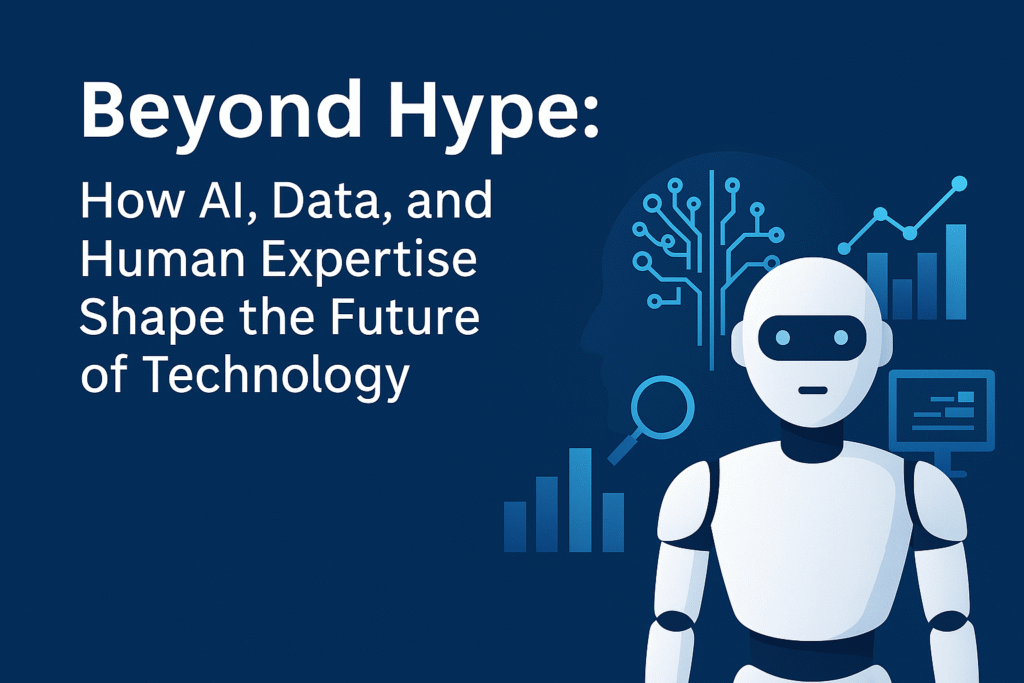Introduction
Whenever a new technology trend dominates headlines, whether it’s blockchain, the metaverse, or artificial intelligence, there’s always a question lurking behind the buzz: Is this hype, or is this the future?
In my journey as a writer and a learner in Data Science, Generative AI, and now AI Engineering, I’ve come to a simple conclusion: AI and data analytics are not hype. They fundamentally shift how industries think, decide, and grow. But here’s the nuance often missing in online discussions: AI alone isn’t enough. The combination of AI, data, and human expertise truly unlocks transformation.
This article builds on my earlier insights in AI Trends Transforming Tech in 2025 and AI + Data Analytics for Smarter Decisions to highlight where the future is heading.
Moving Beyond Dashboards: From Data Overload to Actionable Intelligence
For years, companies have invested heavily in dashboards and KPIs. The problem is information overload. Leaders often have numbers but not clarity.
AI-driven analytics changes this dynamic. Instead of waiting for quarterly reports, businesses now get:
- Predictive alerts before risks materialize.
- Recommendations, not just metrics.
- Contextual insights powered by LLMs explain why patterns matter in human-readable language.
This shift matters because executives no longer want “more data”; they want faster decisions.
Industry Snapshots: What Experts Are Actually Doing
I’ve observed a recurring theme across industries: those who integrate AI with domain expertise are pulling ahead.
- Healthcare: AI assists radiologists, but the radiologist’s expertise validates and refines AI predictions. Without the human layer, trust collapses.
- Finance: Machine learning models flag anomalies in seconds, but seasoned analysts decide whether those anomalies indicate fraud, strategy shifts, or noise.
- Semiconductors: Engineers blend AI-driven verification with deterministic proof in the technical blogs I’ve written for global clients. This hybrid approach ensures chips meet safety standards without risking costly errors.
These aren’t theoretical examples; they’re case studies where AI augments, not replaces, human expertise.

The Human Element: Why Expertise Still Wins
One of the myths I frequently challenge is that AI will “replace” human judgment. Having worked closely with AI concepts in my training and content projects, I’ve seen the opposite: AI elevates experts by removing grunt work, so they focus on strategic insights.
For instance:
- A data scientist can spend less time cleaning data and more time asking the right business questions.
- A healthcare researcher can skip manual literature reviews and instead focus on designing better clinical trials.
- A business leader can spend less time interpreting dashboards and more time leading change.
The pattern is clear: human expertise remains irreplaceable, just being redirected to higher-value decisions.
Building Trust: The EEAT Principles in AI Adoption
If there’s one thing industry leaders agree on, it’s this: adoption will stall without trust. From my perspective, there are four pillars companies must prioritize:
- Expertise: Invest in training and certification (for both teams and leaders).
- Experience: Deploy AI in real-world pilots before scaling.
- Authoritativeness: Use peer-reviewed frameworks and benchmark models against gold standards.
- Trustworthiness: Respect privacy, explain outputs, and keep a human in the loop.
Without these, AI initiatives risk being dismissed as hype rather than embraced as strategy.
The Road Ahead
We’re entering what I call the “Age of Applied Intelligence.” It’s not about AI demos or experimental labs anymore. It’s about integrating AI with real data, real experts, and real impact.
Whether it’s Agentic AI orchestrating workflows or industry-specific models trained on specialized data, the future belongs to organizations that recognize this balance:
- Data for scale
- AI for speed
- Humans for judgment
Conclusion
When I speak to technology peers and clients, one message resonates most: AI isn’t here to replace us. It’s here to work with us. The winners of tomorrow will be those who combine AI’s speed, data’s depth, and human expertise’s wisdom into one continuous cycle of learning and decision-making.
That’s not hype, it’s the future unfolding before us.
FAQs
1. What does “beyond hype” mean in AI and data analytics?
“Beyond hype” refers to moving past inflated expectations about AI and focusing on real-world applications where AI, data, and human expertise create measurable value.
2. How do AI and data analytics work together?
AI enhances data analytics by automating analysis, detecting hidden patterns, predicting future outcomes, and delivering actionable recommendations—making insights more accurate and timely.
3. Why is human expertise still important in the age of AI?
While AI can process vast amounts of data, human expertise ensures context, ethical judgment, and strategic decision-making—areas where machines still fall short.
4. What industries benefit most from AI and human collaboration?
Key industries include healthcare (early disease detection), finance (fraud prevention), manufacturing (predictive maintenance), retail (personalization), and semiconductors (verification and design).
5. How do Large Language Models (LLMs) support decision-making?
LLMs help interpret unstructured data, generate reports, and provide natural language insights, making technical findings accessible to non-technical stakeholders.
6. What are best practices for adopting AI in business?
Businesses should start with clear use cases, ensure high-quality data, prioritize explainable AI, maintain human oversight, and follow compliance and ethical guidelines.
7. Is AI replacing humans in decision-making?
No. AI augments human decision-making by reducing repetitive tasks and providing data-driven insights. Humans remain essential for strategic, ethical, and creative decisions.
8. What is the future of AI and data analytics?
The future lies in Agentic AI, domain-specific LLMs, and real-time edge analytics—where AI anticipates challenges, adapts dynamically, and works seamlessly with human expertise.


